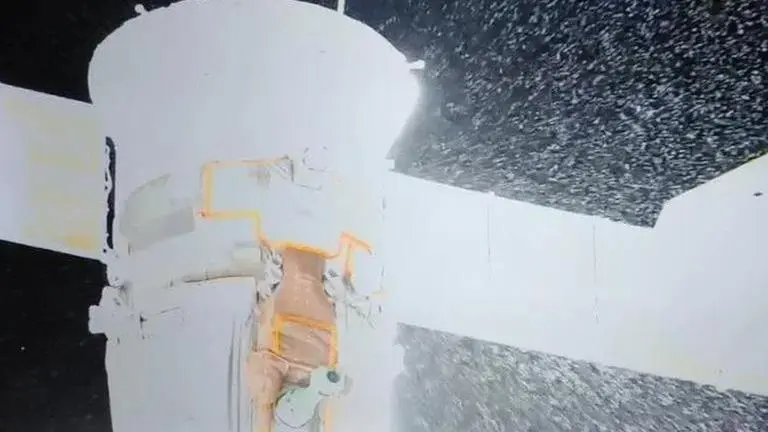Updated 24 December 2022 at 17:36 IST
Leakage on Soyuz spacecraft not caused by micrometeoroid, Russian official confirms
Russia's space agency official revealed that the leakage which occurred in Soyuz MS-22 aboard the ISS did not result from a micrometeoroid strike.
- Science News
- 2 min read

The leakage which occurred at the Soyuz spacecraft aboard the International Space Station (ISS) did not result from a micrometeoroid strike as thought earlier. This confirmation was made by Sergei Krikalev, executive director for human space flight program at Roscosmos, during a recent press conference, Sputnik reported.
Problem with Soyuz MS-22 on the ISS right now! pic.twitter.com/V4Ymvnn2D1
— Chris Bergin - NSF (@NASASpaceflight) December 15, 2022
Flight controllers of Russia's space agency Roscosmos and NASA are currently investigating the cause of the leak which threw out all the coolant required to maintain optimum temperatures inside the Soyuz MS-22 spacecraft. According to Roscosmos, the leak was detected at the radiator of the capsule's cooling system and it lasted for over three hours on December 15.
"At first we thought that there could be a micrometeorite hit, but then we found that the radiator was hit from the other side," Krikalev said during the conference per Sputnik. Follow-up investigations using the robotic Canadarm2 at the station revealed that the Soyuz has an 0.8 mm hole which threw out the coolant. Earlier, suspicions were being made that the hole might have been created due to the Geminid meteor shower which peaked last week. Now that the micrometeoroid is out of question, space debris remains the most likely cause.
Roscosmos plans early departure of its cosmonauts
With MS-22 now being damaged, Roscosmos chief Yuri Borisov said that the agency will send a replacement spacecraft MS-23 by February 19. Cosmonauts Sergey Prokopyev and Dmitri Petelin along with NASA's Frank Rubio were scheduled to leave the station on March 16 but will depart a few weeks earlier due to the incident. The trio launched to the ISS on September 21 from Kazakhstan aboard a Soyuz rocket for a six-month-long stay. Rubio was part of the crew under the seat-swap agreement between NASA and Roscosmos. Following Rubio's flight, NASA launched Russia's Anna Kikina in SpaceX's Falcon 9 rocket.
Advertisement
Meanwhile, the Russian agency confirmed that there is currently no need for an emergency evacuation as the living conditions of ISS residents have not been impacted. Krikalev said that without the coolant in MS-22, which is docked at the Rassvet module, cool air is being supplied to the spacecraft through the Russian segment of the ISS.
Published By : Harsh Vardhan
Published On: 24 December 2022 at 17:36 IST
